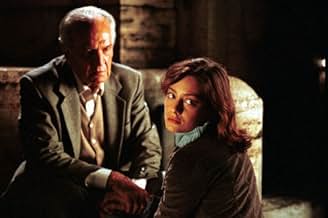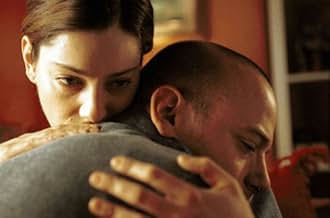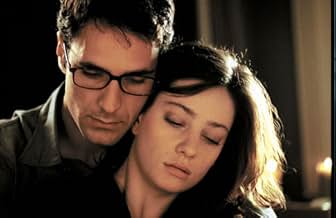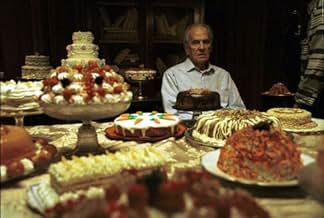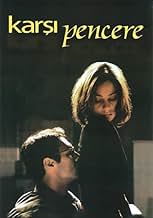
Überlastet und in einer faden Ehe gefangen, beginnt Giovanna, sich um den jüdischen Holocaust-Überlebenden zu kümmern, den ihr Mann mit nach Hause genommen hat. Sie fängt an, über ihr Leben ... Alles lesenÜberlastet und in einer faden Ehe gefangen, beginnt Giovanna, sich um den jüdischen Holocaust-Überlebenden zu kümmern, den ihr Mann mit nach Hause genommen hat. Sie fängt an, über ihr Leben nachzudenken, und fühlt sich immer mehr zu dem Mann hingezogen, der ihr gegenüber wohnt ..... Alles lesenÜberlastet und in einer faden Ehe gefangen, beginnt Giovanna, sich um den jüdischen Holocaust-Überlebenden zu kümmern, den ihr Mann mit nach Hause genommen hat. Sie fängt an, über ihr Leben nachzudenken, und fühlt sich immer mehr zu dem Mann hingezogen, der ihr gegenüber wohnt ...
- Regie
- Drehbuch
- Hauptbesetzung
- Auszeichnungen
- 34 Gewinne & 24 Nominierungen insgesamt
- Tintora
- (as Veronica Bruni)
- Alessio
- (as Ohame Brancy Chibuzo)
Empfohlene Bewertungen
Let me start to say like this: I watched it last night, and all my day today I have the frames hoovering around my mind, notes of the soundtrack ringing my ears. I spent extra hours in the middle of Istanbul's heavy traffic just get its soundtrack CD, but, my efforts in reaching it resembled Davide's efforts for finding Simone....all sold out.
As they say about some legendary directors, Ferzan Ozpetek's film has something to do with the fragile senses of life, not so much to bring tears into your eyes, but so much to tickle your fragile senses. He never chose to create a full blown drama, he never used cliche Hollywood tactics. In this film, it starts out to be a story of an ordinary middle class Italian family, having the typical life problems. Then, as the time passes, the film grows into itself and turns out to be one of the finest enjoyments of the silver screen. The scenes where Giovanna and Lorenzo chase Davide to the closed shop and then to the little caffee, the seemless changes of characters as the camera moves in circular motion, the dance of Davide with Giovanna, the cake making, all like a gentle hand caressing our fragile feelings. Excellent director of photography, magnificent music, larger than life actings of Mezzagiorno and Girotti were the reminicinces of last night's feast in my mind.
I don't know why, but Ozpetek always have something to say about gay relations. This film could have been as magnificent or may be more in a straight relationship story. Ozpetek moves his camera very gently, use the most relevent music themes to trigger quite elegant feelings of our lives. After seeing this film, I've realised how much I was surrounded by the cliche Hollywood films, all following pretty much the same formula. For those who haven't seen it yet, I guarantee at least that you shall experience a quite a different and interesting enjoyment, may be the most different one.
The film ended, and I stayed to the very end of the credits just to listen more of the great music. The last scene where he zoomed into Mezzagiorno's enchanting eyes was like a Sergio Leone closeup. Leone chose to zoom into his men with no name, Ozpetek chose to zoom into his real life characters...those characters that have the most elegant feelings in their eyes....and Giovanna Mezzogiorno...how can I describe that plain beauty? If I was to encounter somebody like her, I'd undertake all the penalties of life just to look a bit into her eyes. I wouldn't be able cook as good cakes as Davide, but do whatever it takes to make sure she stays there forever.
Go and see this film...make yourself a favor...get your feelings sense some of the most elegant moments of your life
Without the relying on clichéd plot-devices, it achieves a striking level of dramatic intensity through character and relationship development. You care what happens to them as if you knew them personally and thats why it works.
As soon as the credits began to roll, I immediately wanted to watch the film all over again. It left me with so many questions and thoughts, about my own life- a cinematic version of Coelho's Alchemist?
For me, the recurring theme in the film, is choices- life choices- forks in the road- and the consequences our decisions yield.
1. Davide stalling on the cobbled stoned streets- torn between his lover and his town. 2. Giovanna and Filippo on the bridge, arguing whether they should get involved with the strange old man. 3. Giovanna and the two men in her life. 4. Giovanna at window in Lorenzos house having a crisis of conscience. 5. Lorenzo taking up the work opportunity, instead of staying in Rome. 6. Giovanna changing careers. 7. Giovanna running down the steps at the end- mirroring the opening scene of the film, she becomes Davide's character in that she makes the ultimate sacrifice for her family. Although we are never told it directly, we realize afterwards that Davide has died- In the way that Giovanna talks about him; saying she misses him now he's gone. "Does everyone that leaves you, leave something of themselves behind". Giovanna says that she hears him in HER voice, and feels him in her gestures. The symmetry of this film is what makes it so beautiful and complete.
The message? Follow your passion, follow your heart and you will have no regrets Something that really made me think was the line Davide said to Giovanna- " You have turned your passion into a hobby. You should never do that with a talent" So finally Giovanna finds her true love- her liberation from a life she no longer loves.
Another element that adds to the realism is the dialogue- From the electrifying opening argument between the two lovers, to the smart quips of the brainy daughter, every character is given a chance to shine. Such a relief from the typical Hollywood crap we are forced to endure.
Everything about this films, seems to linger long after you leave the cinema. The visual beauty, the score, Giovanna's beautiful eyes, the scenery- a true delight of a film that I love recommending to friends.
This is a film that presents two stories that are completely different from one another. The beginning of the movie takes us back to 1943 Rome, at the height of the war. We witness what happens in the opening sequence without any knowledge of how will it play in the total outcome of the picture.
The film then changes to present day Rome. We see Giovanna and Filippo, who are struggling to make ends meet. They meet one day a mysterious old man who is trying to give them money. They end up bringing him home since the local police can't do anything. This man, Simone, has the clue to the puzzle of the first part of the film, but that will come at the end.
Giovanna's marriage to Filippo is in danger of failure. Giovanna suddenly discovers a life in the apartment across the street. Lorenzo, who lives alone, turns out has been spying on Giovanna as well. They get to meet, but common sense prevails and their possible relationship never amounts to anything.
Giovanna Mezzogiorno is one of Italy's leading actresses. Not only is she attractive, but she can act, as well. Miss Mezzogiorno has one of the most expressive and beautiful eyes we have seen in a long time. Not only that, but she expresses so much by looking directly into the camera.
Massimo Girotti, another great figure in the Italian movies is the mysterious Simone, who in reality is Davide, a master dessert chef who owned one of Rome's most prestigious pastry shop. Mr. Girotti's magnificent presence in the film makes the most with his pivotal role.
The film is deeply satisfying. Another great film by Ferzan Ozpetek.
Ozpetek's strength is his ability to portray characters that are realistic without being obvious, so everyone can relate to them without identifying with them. He showed that already good ability in "Le fate ignoranti" as well, but this time he seems to have developed it even further. His approach is always personal, and this enables him to make films that are deeply introspective. It is the kind of films that the French are usually good at making, but Ozpetek in not an imitator. What makes his films so DIFFERENT is that there seems an emotional involvement that is very difficult to find elsewhere; at the same time, this never translates into trite sentimentalism or dull rhetoric.
This is an outstanding film, and this is so also thanks to the performances given by most of the actors. Massimo Girotti, in his last appearance before his death, shows that, at about 80 years of age, he was still able to be a first-class actor (and this explains why he featured in so many films by Visconti); after this film, which is dedicated to him, we will all miss him even more than we already did. Giovanna Mezzogiorno, the daughter of a late actor herself, also gives an outstanding performance as the woman who finds herself at the crossroads and is torn between passion and the responsibilities of everyday life, between reality and desire, just like so many of us often are. Filippo Nigro, who also featured in a minor role in "Le fate ignoranti", is given a more important role in this film, and deservedly so. The only exception is Raoul Bova, and I wonder why Ozpetek seems to have a compelling need to cast "actors" who are more sort of toy boys, mostly in secondary roles (Bova in this case, Gabriel Garko in "Le fate ignoranti"), who usually have very limited acting abilities and who almost inevitably end up faring very poorly and suffering from the comparison that is inevitably drawn between their performances and those of the other actors who feature in the films; which is even more striking if we take into account the fact that Ozpetek seems to have the ability to rejuvenate actors and to make them play characters that are very different from their clichés (as an example, consider not only Massimo Girotti in this case, but also Margherita Buy in "le fate ignoranti").
Just one word for the soundtrack, which made the film even more touching and has spawned a major Italian chart hit.
The only criticism that can be made? How come that Italian directors seem to have lost the ability to say something about the society in which they live? In the past, they were able to be sardonic about it, and to intertwine the two levels, social and personal. Now the only films they seem able to make are personal-only stories, and that's a pity.
Altogether, a deeply recommended film.
The "Rear Window" eroticism is just one element that accidentally brings together tangled, stymied lives swirling around lovely, exhausted, frustrated chef, wife and mother Giovanna Mezzogiorno, where each child, man, woman, friend and neighbor has separate priorities and fantasies that annoying real life interferes with, from the practical to the political.
Each character and their ties are both delightfully and surprisingly complex and the actors are so comfortable bringing each to complete life that you think you too should be able to come out of the theater speaking Italian so naturally.
But this is a frank, gritty, contemporary, urban Italy we don't usually get to see, with multi-racial immigrants, underemployment and a Fascist past.
The sentimentalism of the live with no regrets lesson is leavened by the seriousness of the final revelations and the compromises that each character still makes.
The music selections nicely fit each character.
Wusstest du schon
- WissenswertesMassimo Girotti died on 6 January 2003 and the movie is dedicated to his memory. Before he was cast, Ferzan Özpetek had considered also Jean Rochefort and Serge Reggiani for his role.
- SoundtracksLa Finestra di fronte
Written by Andrea Guerra
Top-Auswahl
- How long is Facing Windows?Powered by Alexa
Details
- Erscheinungsdatum
- Herkunftsländer
- Offizielle Standorte
- Sprache
- Auch bekannt als
- Facing Windows
- Drehorte
- Ponte Sisto, Rom, Latium, Italien(where Giovanna and Filippo meet Simone)
- Produktionsfirmen
- Weitere beteiligte Unternehmen bei IMDbPro anzeigen
Box Office
- Bruttoertrag in den USA und Kanada
- 543.354 $
- Eröffnungswochenende in den USA und in Kanada
- 36.061 $
- 20. Juni 2004
- Weltweiter Bruttoertrag
- 15.535.312 $
- Laufzeit1 Stunde 46 Minuten
- Farbe
- Sound-Mix
- Seitenverhältnis
- 2.35 : 1
Zu dieser Seite beitragen






